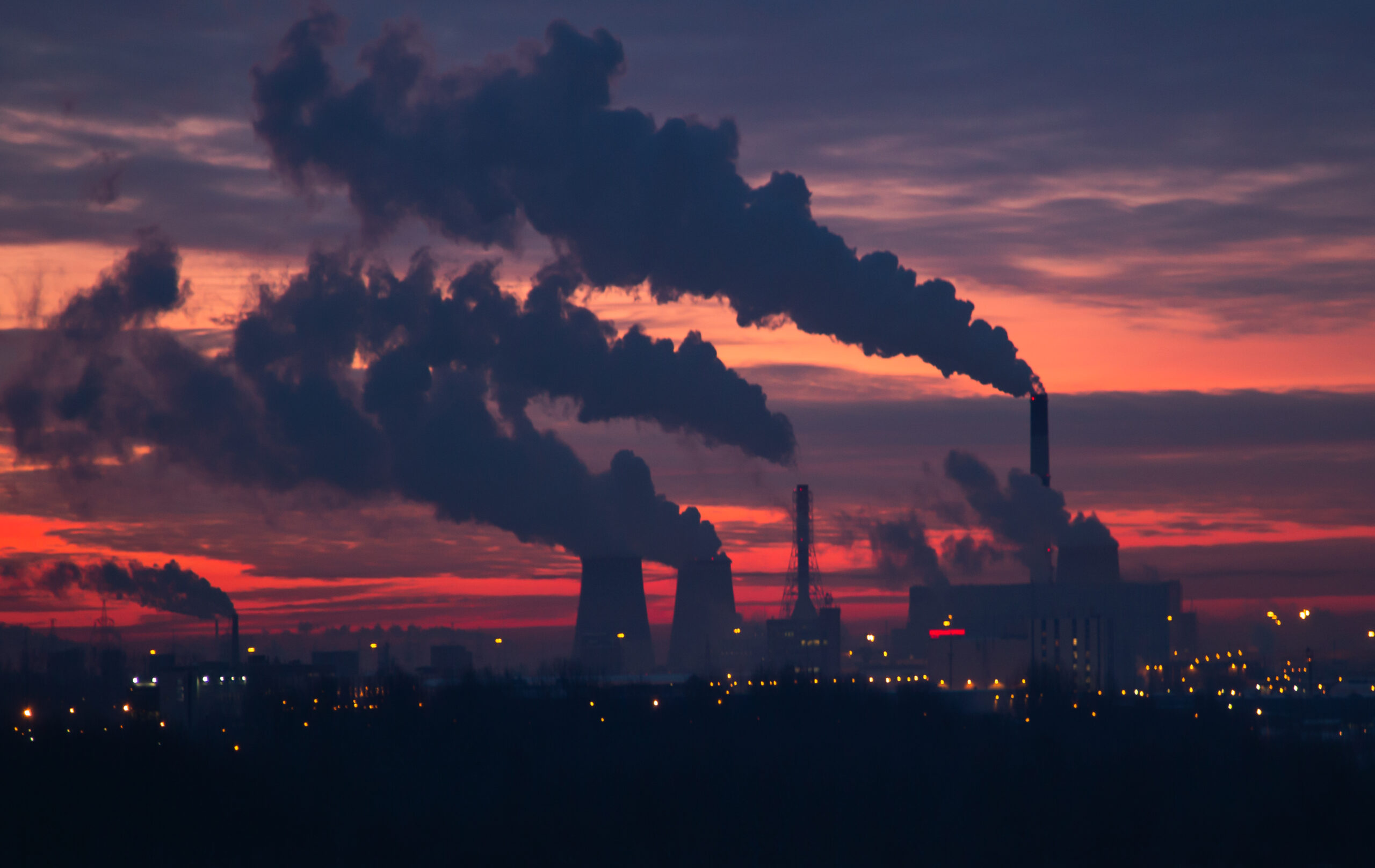‘Closing the Gates to Hell’: A Global Plan to Phase Out Fossil Fuels and Accelerate a Just Transition
Bioneers | Published: July 16, 2024 Eco-NomicsEcological DesignIndigeneity Article
How do we get away from coal, oil and gas, and on to the future that we want? Learn about the call for a Fossil Fuel Non-Proliferation Treaty and how an international coalition is plotting the course for a just transition to clean energy and low-carbon solutions. In this Bioneers panel discussion, a group of civil society, government and Indigenous leaders discuss the growing momentum for a Fossil Fuel Treaty.
The panel features Osprey Orielle Lake, Founder and Executive Director of Women’s Earth and Climate Action Network; Eriel Deranger, Founder and Executive Director of Indigenous Climate Action; climate and campaign strategist Michael Brune, Director of Larsen Lam Climate Change Foundation; Eduardo Martinez, longtime activist and current Mayor of Richmond, California; and Bryony Worthington, a key architect of the United Kingdom’s world-leading Climate Change Act and co-chair of Peers for the Planet. The panel was moderated by Cara Pike, Senior Communication Advisor to the Fossil Fuel Treaty and Founder and Executive Director of Climate Access.
The following discussion has been edited for clarity.
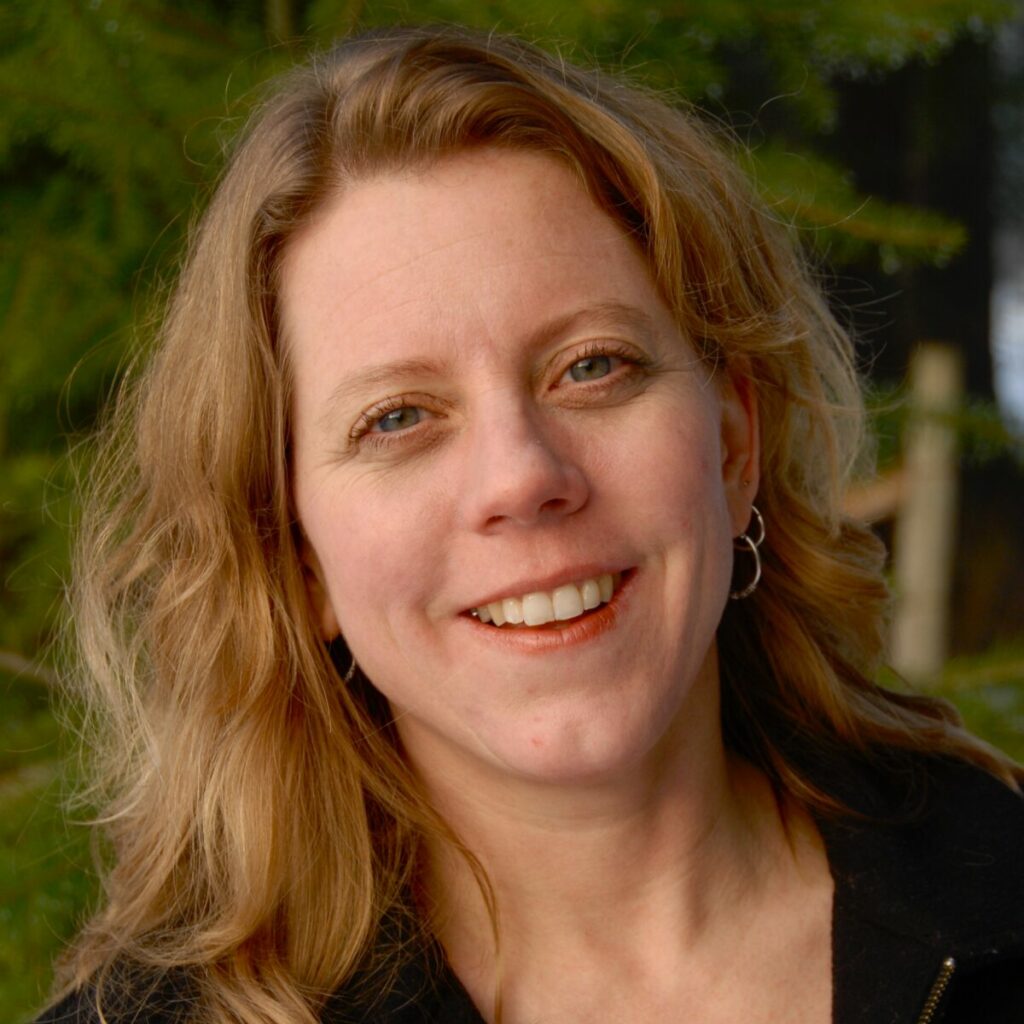
CARA PIKE: I’m Founder and Executive Director of Climate Access, and also Senior Communications Advisor to the Fossil Fuel Non-Proliferation Treaty. I’ve been fortunate to be part of the Fossil Fuel Treaty initiative since before its launch in 2019, and it’s been a wild, wonderful ride to see the momentum now growing for an international agreement to get us away from coal, oil and gas, and on to the future that we want.
Why did we name this panel “Closing the Gates to Hell?” Well, last November, the United Nations Secretary General said that we are opening the gates to the hell of fossil fuel-driven climate impacts if we allow the production of oil, gas and coal to expand, as the naked greed of entrenched interests that are raking in billions from fossil fuels would like us to do. Despite scientists from the Intergovernmental Panel on Climate Change (IPCC) and the International Energy Agency making it clear in report after report that we can’t have any more extraction, governments around the world are on track to expand to levels that would result in 110% more pollution than what we can handle to stay alive, to stay to that agreed-upon goal of keeping warming to 1.5 degrees. So we have a lot of work to do to turn things around.
What we’re really trying to do with this initiative is to go after the fossil fuel industry, which has long been deceiving us about its impacts on climate, human health and wellbeing, and the entire web of life. Those companies have engaged in massive greenwashing campaigns and lobbying efforts to water down the language in climate agreements, to dupe the public and to halt or slow progress to a green economy.
The growing movement for a fossil fuel treaty, which is what we’re here to discuss, seeks to foster international cooperation to end new extraction, wind down existing production, and expedite a transition to alternatives, but in a fair way, so developed countries that have benefitted the most from fossil fuels have to support the transitions of poorer countries ravaged by the legacies of colonialism.
Let’s lead off with Baroness Bryony Worthington, who has been a key figure in getting this initiative off the ground:
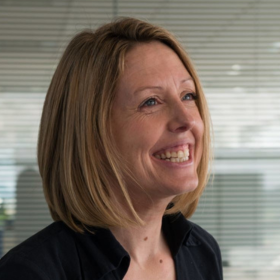
BRYONY WORTHINGTON: I’ve long been a fan of the Fossil Fuel Non-Proliferation Treaty campaign because I believe in the power of laws to help us solve problems of the “Tragedy of the Commons.” You can’t deliver everything just through local action with a complicated problem such as climate change, which is a global challenge. So when I was made co-director of a new climate foundation, I was searching for ideas that we could fund that would be commensurate with the scale of the problem, some kind of a macro lever we could pull that would help us make progress.
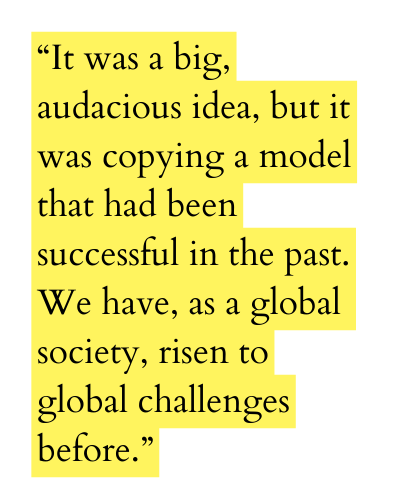
At a chance meeting at the Conference of the Parties (COP) in Madrid, I met the treaty team, and they gave me a two-minute elevator pitch. It was the first time I’d actually heard something that met the bill. It was a big, audacious idea, but it was copying a model that had been successful in the past. We have, as a global society, risen to global challenges before. The Nuclear Non-Proliferation Treaty is a good example, as is the Montreal Protocol, which stopped the erosion of the ozone layer.
So, a legal approach at a global level was appealing, and I could instantly see as well that they had the right approach that could help galvanize a lot of disparate campaigns. There are many reasons the fossil fuel industry is under attack: it has loads and loads of disparate impacts on lots of communities, but there hadn’t yet emerged a really galvanizing kind of lightning-rod campaign that could unify them. The best that we had, really, was the youth movement and Greta Thunberg saying, “Follow the science,” but we needed something much more specific, and the treaty offered that. I persuaded the board of the foundation that the journey would be the destination. We didn’t need to win a treaty, just the act of calling for it could change the dynamic and put us on the front foot, so I was very happy to back it.
CARA: I want to recognize that this initiative builds on decades of efforts fighting fossil fuels, many grassroots efforts, including the work of Pacific Island nations who were first to call out the climate crisis and were first to call out the need at the international level to come together to address fossil fuels, so this is building on decades of work. Also, it’s important to note that this is a distributed campaign that’s not being led by one organization. There is an international support team, which I’m on, and an international steering committee made up of a number of organizations and leaders from all over the world, including Osprey Orielle Lake, who got involved at a very, very early point in the initiative, so let’s turn to her next.
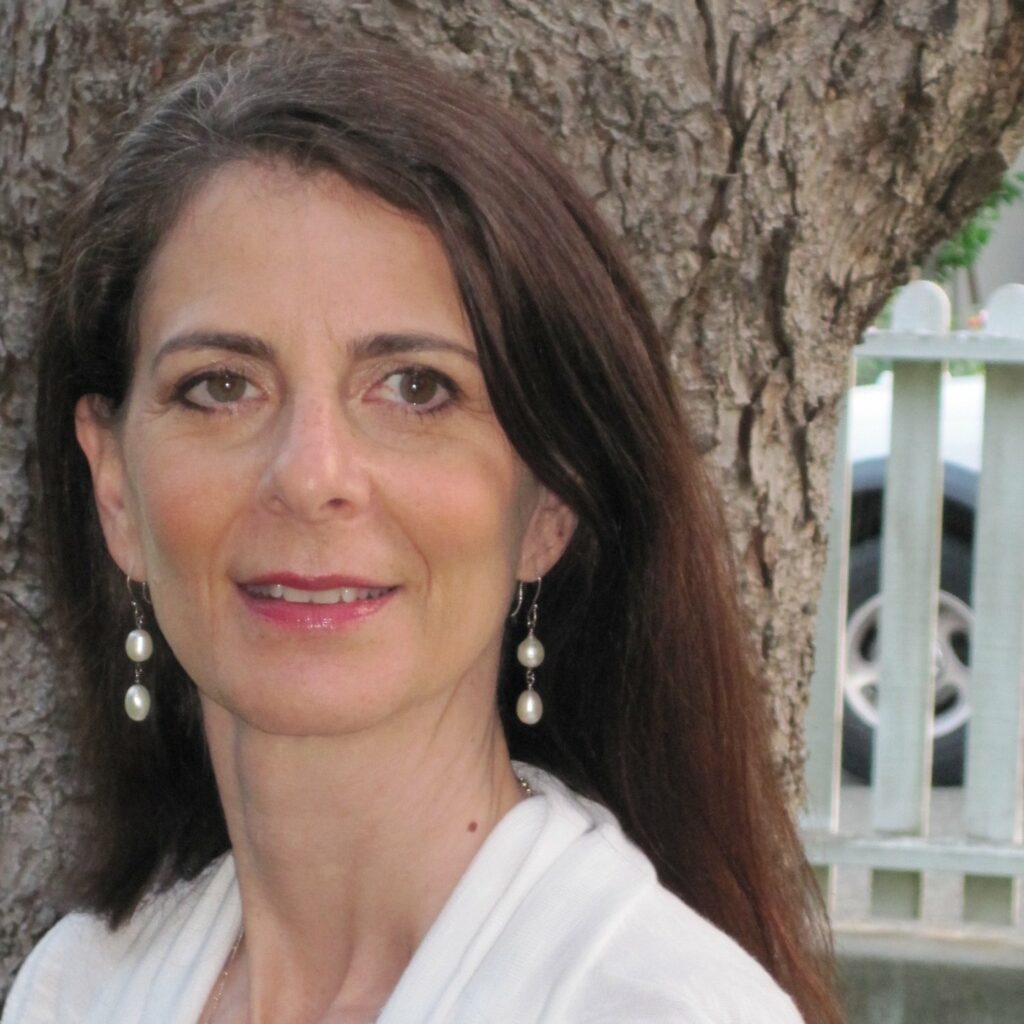
OSPREY ORIELLE LAKE: Yeah, early on, I talked to Tzeporah Berman, who’s now the chair of the Fossil Fuel Non-Proliferation Treaty, about different constituencies that might be interested, in addition to countries. Due to gender inequality, women are very often impacted first and worst by climate change and environmental degradation, so we felt that the treaty would be a really important place for us to focus the attention of a lot of our women’s networks.
We at the Women’s Earth and Climate Action Network have been going annually to the U.N. climate talks for well over a decade. It’s not a fun place to go. You only should go if you really need to go, but there’s really critical work being done there, not just in the negotiations but on the sidelines — a lot of advocacy work and organizing goes on there which has impacted the larger COP. Last year in Dubai, at COP28, the movement for a fossil fuel treaty was very influential in forcing the conversation amongst governments to finally talk about phasing out fossil fuels. That was not on the formal agenda, but our movements forced that to happen. Most governments, in cahoots with the fossil fuel industry, do everything they can to not have a conversation about phasing out fossil fuels.
One of the things that really moved me about being at COP28 was that several new countries came on board to back the idea of the treaty. In particular, I was really impressed with the president of Colombia because it is a fossil fuel-producing country. To publicly make that statement in that venue at the COP was tremendously powerful. He gave an incredible speech that took a lot of courage. That was a real sign of progress.
CARA: It’s important to note that the movement isn’t just coming from civil society. As we saw with nuclear non-proliferation, in which there was a nuclear-free cities movement, a similar thing is happening with our initiative. We’ve had more than 100 cities and some national governments endorse the treaty, including the City of Richmond and the State of California. Richmond, Berkeley’s neighbor just to the north, is home to a large Chevron refinery. It’s the city’s largest employer, taxpayer, and polluter. Last year, led by newly elected Mayor Eduardo Martinez, the City of Richmond joined the Fossil Fuel Treaty. Eduardo, I’m wondering if you could talk about why you made the decision to join and how it connects to your ongoing efforts to address the major polluter in your community.
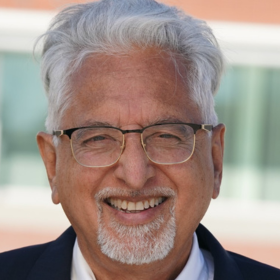
EDUARDO MARTINEZ: Chevron has had a major effect on the health of our community, and it’s a cumulative effect over decades. Chevron also pollutes our elections. They spent $14 million in the past election cycle in Richmond, trying to control the narrative. We need as many different mechanisms to hold them accountable as possible, but we not only need the mechanisms, we need people who understand the science and can keep Chevron accountable to follow through with their commitments when we win lawsuits against them. We’re working really hard to hold Chevron accountable, and one of our greatest strengths in Richmond is the activism of the community. It’s an immense battle, and we need as many treaties and regulations as possible, and mechanisms to make sure that Chevron complies. (Note/update: the Richmond City Council just voted in June to add a local ballot measure in the upcoming November election which would put in place a special tax on Chevron to compensate the community for the impacts of the pollution it generates).
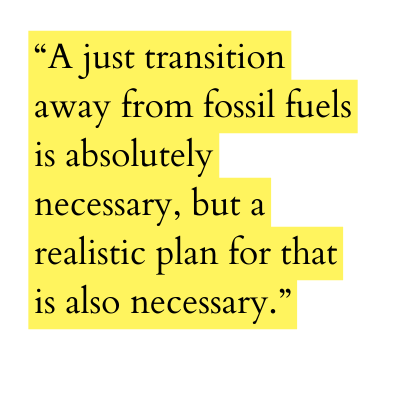
A just transition away from fossil fuels is absolutely necessary, but a realistic plan for that is also necessary. Our staff is doing a study right now to find out how to transition once the refinery in Richmond closes. We know that refineries, when they close, tend to close quickly with no warning. A refinery that burned in Philadelphia closed and left the city with not only an economic hole but a major liability in the cleanup. We know that workers will be out of work, so there will need to be a plan for those workers to be able to transition from the refinery to some fossil fuel-free and renewable energy-related jobs.
We also need to change our culture. We need to change the way we think about how we transport ourselves. We need to make sure that our cities are self-contained, so you can bicycle or walk to where you need to go and your food is grown close to you so you don’t have to have apples transported across the ocean from Australia or New Zealand, or some other place. We also need to create microgrids so that the energy is produced locally and used within smaller communities. There are so many different things that we need to do in order to make this change from fossil fuels to clean energy.
CARA: Thank you, Eduardo, and we’ll really look forward to continuing to watch what’s happening in Richmond. I was reading in advance of this session that Richmond’s local newspaper is owned by Chevron, so when there are massive flaring events or pipes burst and oil spills into the Bay, it doesn’t get picked up in the local paper. That’s the insidiousness of the fossil fuel industry, and they’re like that everywhere they operate. They do have an especially disproportionate impact on Black and Brown communities such as Richmond, but they also have pushed even more aggressively into many Indigenous territories globally to extract fossil fuels. That includes the tar sands of Alberta, from the home territory of Eriel Deranger, who has long been one of the main activists defending Indigenous peoples from the predations of extractive industries.
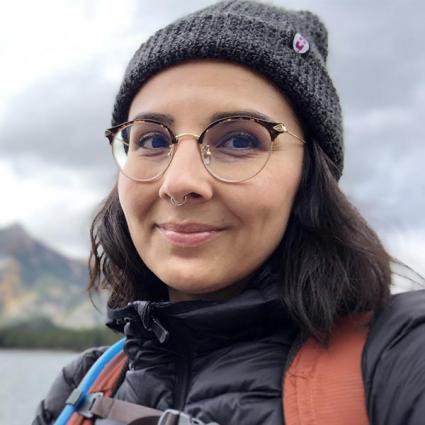
ERIEL DERANGER: My name is Eriel Tchekwie. It is a Dené or Denesųłiné name that means “Thunder Woman.” I am a visitor on these lands of the Ohlone people, and I want to acknowledge that we are guests here today.
The Tar Sands is considered the largest industrial project in the world, not only because of the massive extraction footprint but because of the incredibly gigantic infrastructure associated with that extraction, from the series of pipelines that crisscross the entire continent, as well as the tanker traffic in North American ports. My friend Clayton Thomas-Müller once said that it’s almost like fracking but on crack. The extraction of the oil from the tar sands requires massive amounts of water as they superheat and melt the bitumen and suck it through a giant series of pipelines. There are also a lot of open pit mines where they’re literally scraping the bottom of the barrel for more oil. An immense amount of boreal forest, one of the most critically important ecosystems on this planet, has been completely destroyed.
This ecosystem is also the home of my people, the Athabaska Chippewan First Nation. Our territories have been dewatered. Our water tables have been contaminated and diminished to the point that we are now experiencing one of the worst droughts in history in Alberta. This water system is part of what’s called the Peace-Athabaska Delta System. It’s one of the last inland freshwater deltas in the world, and it’s home to many species at risk, such as woodland caribou, woodland bison, and many migratory birds. For us, Dene people, these lands and territories, these animals, these river systems have been a part of our identity. So as these places are degraded and destroyed, our cosmology and cultural lifeways, our very identities are being destroyed. And, of course, we’re not just talking about the degradation of the land, but the contamination of our bodies, as we’re seeing increased rates of cancers, autoimmune diseases, respiratory illnesses, etc., etc.
For us, the Fossil Fuel Treaty is a tool in the toolshed, because it’s clear that the demands of Indigenous communities have fallen on deaf ears for 500 years. The Indigenous nations in Alberta have long asked for a moratorium on the expansion of Alberta’s tar sands, to no avail. They don’t care, and there is more under production now than there was when I was working under Michael Brune at Rainforest Action Network 15 years ago at the height of our campaigns.
We need as many tools as possible because so far all of the industry’s commitments to reduce their “emissions intensity” have been filled with loopholes that permit them to continue business as usual. What’s really interesting when you look at the original signatories to the Fossil Fuel Treaty is that they are people of color, mostly island nations and Indigenous Peoples, because we are the first and foremost to be impacted by the grotesque impacts of this industry. So of course we’re going to be the first to stand up and demand something better. But we cannot rely on Indigenous Peoples and people of color alone to do the labor to save this planet. It’s time for colonial states and high-producing countries such as the U.S. and Canada to step up and finally address the historic harms that they have done to the people and the planet if we’re ever going to actually achieve anything remotely close to climate justice.
CARA: Michael, could you share your views on how the Fossil Fuel Treaty could complement or boost other existing efforts, such as divestment campaigns?
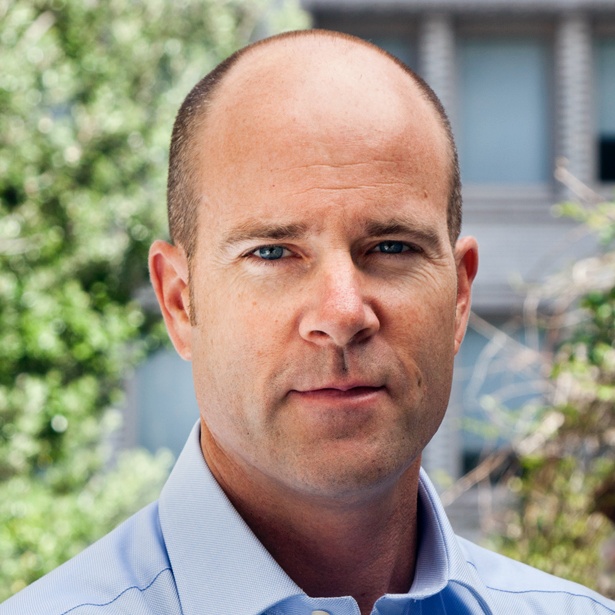
MICHAEL BRUNE: The idea behind the treaty is super simple: it’s that supply and demand are linked. You learn that in high school if you take a basic economics class. For the last several decades, most of the attention from funders and policymakers and most of the political willingness to do anything has almost entirely focused on what’s called the demand side — the incentives to make clean energy cheaper or more affordable or more accessible; the work of entrepreneurs and scientists and innovators to make the alternatives to fossil fuel more present across the economy. Lots of progress has been made so that we can now actually plausibly say that we can have a healthy economy without fossil fuels whatsoever.
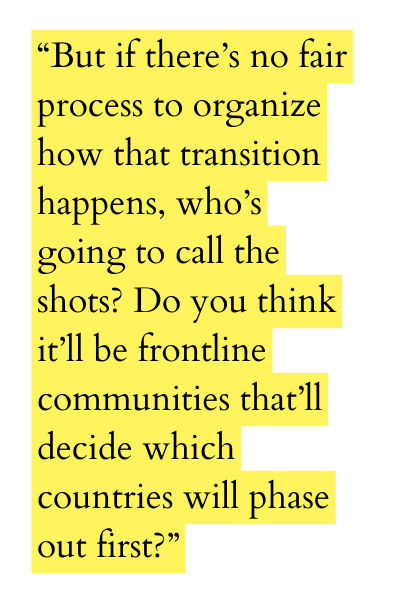
But it obviously hasn’t worked for frontline communities in the Amazon, or in the Arctic, or in Alberta, or here in Richmond. It certainly hasn’t worked from a climate change perspective. We shouldn’t have to be calling for a treaty. This should have been done decades ago, at the beginning of the climate movement. We should have said that we need to create the alternative to fossil fuels, and we have to have a rational discussion about how to phase out fossil fuels.
The idea of this treaty is to create a conversation because eventually, we will phase out of fossil fuels. Eventually, I think, we will be successful at creating a new economy that’s based on clean energy. But if there’s no fair process to organize how that transition happens, who’s going to call the shots? Do you think it’ll be frontline communities that’ll decide which countries will phase out first? Or do you think it’ll be the United States and the richest and most powerful countries in the world? We have to have a rational conversation in which people from the bottom up — grassroots community organizations, Indigenous community organizations, some of the smaller producing countries that are currently dependent on fossil fuels — have a say in who phases out first and who gets to profit while we transition away from fossil fuels. That’s the idea behind this whole treaty.
CARA: The ultimate goal is to get a binding agreement, but it is about the journey and about putting pressure on decision-makers, so we’re excited that we have now close to 2,500 groups from around the world who have endorsed the treaty. It’s a distributed network model, so these groups are all off running campaigns on their own, pushing different levels of decision-makers within their communities or regions to take action, such as the growing efforts to push for fossil fuel-free zones in the Pacific and in the Amazon. We’ve put a major emphasis on building a network with a lot of civil society organizations and leaders from the Global South, and we’ll continue to do that, but we need to start to put more pressure on the big producing countries in the Global North.
At the state level, California has endorsed. Hawaii was the first U.S. state to endorse, and Maine has as well. But we need to keep in mind that the U.S. and Canada have the most aggressive plans to expand fossil fuel extraction of any nations. So I’m wondering, Michael, since you were involved in helping to secure the California endorsement, where you think things need to go with the Fossil Fuel Treaty in the U.S.?
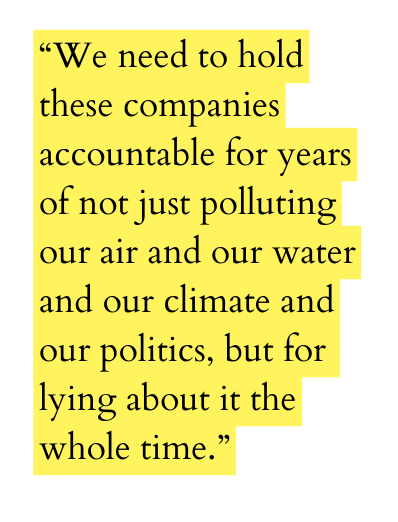
MICHAEL: Where do things need to go? Everywhere. One key thing we need is lots of real, local examples of communities turning away from fossil fuels. Sometimes that’ll look like what’s happening in Richmond, where there’s a ballot initiative to put a dollar-a-barrel tax on Chevron there. That isn’t a treaty; it doesn’t mean that the company will move out, but it’s a major move to hold the company accountable.
In California, across the whole state, there’s a ballot initiative about whether or not we should drill and frack within half a mile of healthcare centers, daycare centers, schools, and places of worship. So if you care about these things, get involved in that to make sure that we win. And every city in the state can take action to begin to move away from fossil fuels, either by signing the Fossil Fuel Treaty and/or suing the oil industry, as Berkeley, Oakland, San Francisco and Marin County have all done. We need to hold these companies accountable for years of not just polluting our air and our water and our climate and our politics, but for lying about it the whole time.
There are lots of ways to take action, but the key is all of us taking action. If you are motivated to do something on what’s called the demand side and make clean energy more affordable and accessible, that’s great. You could also work on phasing out fossil fuels because there are millions of people who want to work with you on that.
CARA: Some treaties have been successful. Some of them have gone through existing international institutions, such as a recent agreement on plastics that came through the U.N. In other situations, groups of individual countries initiate action when achieving a veto-proof consensus (as is needed in the U.N.) is not possible. That was the case with the land mine ban, when Canada and a handful of other countries just started meeting, knowing the major powers wouldn’t agree to it.
With the Fossil Fuel Treaty, we are working within the U.N. framework, but we’re also working directly with the 12 countries that have endorsed it so far — on putting together diplomatic dialogues that they’re leading, nation-to-nation, and starting to talk about the terms of a treaty. So we’re working at both pathways. But Eriel, could you share how we got here and where you think things need to go?
ERIEL: The big climate gatherings, starting with Kyoto Accord, have for a long time produced really weak, non-binding statements that were more economic agreements than any real action on climate. Nearly all serious civil society activists and frontline countries considered them to be garbage but felt unable to affect the outcomes, but at Copenhagen in 2009, we started to see a shift. We started talking about a need to really phase out of fossil fuels and dirty energy projects. We started talking about moving away from economic agreements as a way to solve the climate crisis.
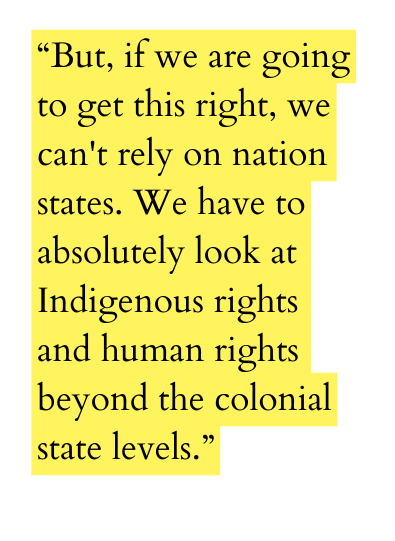
What we’ve seen since 2009, since the Paris Agreement, is civil society and Indigenous Peoples mobilizing and effectively changing the discourse and the dialogue, and the negotiations within these spaces, to include more progressive language. That includes recognition of human rights, the rights of Indigenous Peoples, Indigenous knowledge systems, and human rights-based approaches to the climate crisis.
But the roots of this push had started a long time ago when Indigenous Peoples in 1992 met before the Earth Rio Summit and said we need to have agreements that look at our interrelationships with the natural world, and that called out extractive industries as dirty and harmful. So, civil society groups and Indigenous Peoples have been advocating for this for a long time, but in recent years there has been a more concerted effort to really get this on the table, and the fossil fuel interests are clearly worried.
But, if we are going to get this right, we can’t rely on nation states. We have to absolutely look at Indigenous rights and human rights beyond the colonial state levels. Those that have been asking for a phaseout of fossil fuels for far longer than anyone else are Indigenous communities, and it’s really, really nice for us to have the Fossil Fuel Treaty come and join us in this cause, but we still have so much work to do to get to the point at which COP meetings no longer wind up with weak language and countless loopholes. I don’t attend the COPs because I have faith that global leaders are going to do the right thing. I attend COPs because I want to make sure that they don’t do the worst thing.
CARA: When we launched the treaty initiative, we had a whole debate: Will we ever have a country sign? Is it just a vehicle to put on pressure or is this actually a thing? And now it’s an actual thing. The first two nations to join were Vanuatu and Tuvalu, and now 12 have joined as well as nine Indigenous nations from the Amazon. Bryony, do you have any thoughts on other key steps in the pathway forward beyond the U.N. that we should be thinking about?
BRYONY: We, the people who care, who want this planet to be a safe and sustainable place, are in the majority. We’re led to believe that we’re not by a very vocal minority on the far right that wants to make us all fight against each other and to convince us that there’s an “other,” a “them” who are causing our problems. The heart of getting to a solution on this is democracy. It’s basically standing up and electing the right people, getting the right councilors, the right mayors, the right M.P.s, the right presidents to take this forward. Because if you don’t have that, you are limited to only working at a local level, and you’re much more easily dispersed and divided. We have to re-engage in democracy and make sure we have the right people representing us.
As I mentioned earlier, we’ve done this before. We have saved the planet before, as we did with the ozone crisis. So we have examples of pathways. Of course, there are going to be bumps in the road, but ultimately understanding that we have to address this at a global level is the first step. And that’s why the treaty is so important.
You can do tons of stuff at the local level to erode the social license of the fossil fuel industry and take away demand for their products, and they’ll start to crumble, but they could crumble in a very disorderly and unfair way. The market will not make this a fair transition. It’ll be ugly and unfair, fundamentally unjust. So, it would be incredibly helpful to have a fast, fair and forever treaty that locks in a plan that we all agree is necessary and is commensurate with the scale of the problem. If we can take what we achieved at Paris and through the United Nations Framework Convention on Climate Change as a stepping stone, work till we get to the ultimate goal, which is a complete transition out of this industry. That is why I think this campaign is so important.
What follows was part of the Q&A segment of the discussion:
Audience Member (AM): When fossil fuels are phased out, what will life look like? Is there a plan to guarantee that there will be lights at night, etc.? What will the transition look like?
EDUARDO: It’s going to be different in different places, but we need to start thinking about how that transition will happen because it’s not going to happen if we don’t start thinking about it. And if we wait for it to happen, then we’ll be reacting as opposed to being proactive to create a just reality that works for everyone. In Richmond, we have a coalition of many local groups called Our Power Richmond, and they are looking at all the different aspects of what a transition will look like in our economy and culture.
OSPREY: We have to remember that it’s part of the fossil fuel industry’s tactics to make people afraid that we’re all going to have to live in caves with no jobs or lights at night. That fear is one of the ways that they have maintained a stranglehold on financial institutions and governments, so we need to dispel this fear. The fact is that renewables are coming online incredibly fast and at much cheaper rates than fossil fuels. We need to understand that we can transition. It’s not a solutionless problem. We have the solutions. We are fighting the fossil fuel industry, which is one of the biggest industries in the world, with gazillions of dollars, backed by their allies in governments and financial institutions and corporations. That’s the problem, not that we can’t all live well, all of us, after a transition.
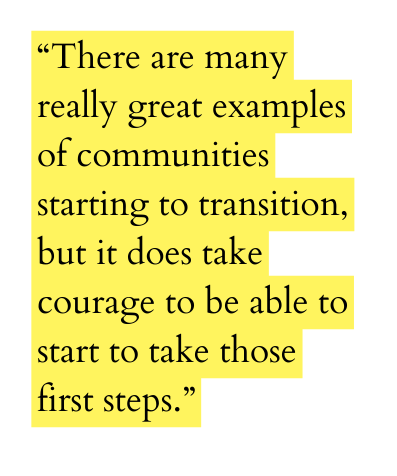
ERIEL: There are many really great examples of communities starting to transition, but it does take courage to be able to start to take those first steps. My community is in the frickin’ heart of the tar sands, and we have a strategy to try to move towards a low carbon lifestyle. We already built the largest off-grid solar farm in the country, and we have plans to get off of diesel that the oil and gas industry has made us so reliant on to heat our homes for the last 100-plus years.
We’re also looking beyond just how we’re heating and fueling our homes and our vehicles. We’re looking at our food sources and how we can reclaim food security and our food sovereignty. Many Indigenous communities are already modeling what it means to transition off of fossil fuels. You can check out Indigenous Climate Action and our publications to look at our new Just Transition guide for more information.
AM: How will the transition affect workers and unions? There’s been a lot of resistance to getting off fossil fuels from some big labor unions.
MICHAEL: The U.S. Steelworkers Union, which represents a lot of refinery workers across the country, and a little bit overseas, put a bunch of money into studying how steel mills can be made greener using cleaner fuels. The BlueGreen Alliance is working with several different unions — laborers, electrical workers, and quite a few others — to figure out how to transition workers to jobs that are just as good paying and closer to home. And then, of course, there’s a lot of clean energy investment in the Inflation Reduction Act, the infrastructure bill, that provides extra incentives for companies that are offering well-paying, high-road union jobs in the clean energy industries that are displacing fossil fuels.
An encouraging thing is that across the movement, there’s been a lot more attention to making sure that the clean energy jobs are actually good, family-sustaining, well-paying jobs, ideally unionized, so that we can argue to the labor movement and union leaders that workers can have just as good of a life, and work close to home, in a way that supports survival of life on the planet.
AM: How do we stop new fossil fuel exploration?
BRYONY: I think this is at the heart of why we need some sort of international discussion around this, because there are certain countries that could much more easily forego new drilling. Norway is a prime example, a small country with a sovereign wealth fund that has $1.5 trillion in it that they’ve amassed from their oil and gas extraction, and they are not coming off oil and gas. They’re still selling new leases in the North Sea, so one of the richest countries on Earth, per capita, is continuing with this myth that they have to keep taking the oil and gas out of the ground to have a healthy economy. If we can’t convince the Norwegians that they need to stop, we’re not going to make it.
Canada is probably the next in line in terms of the most egregious forms of extraction. It’s not just the tar sands; they also have a huge fracking enterprise in British Columbia. Canada is a rich nation. It could move to a clean electrical system. We’ve got to get real about who is going to be the country that is the first country to agree not sell all its barrels. The oil and gas industry wants us to believe that everybody has to extract every last barrel. That is their narrative, and we have to push back on it.
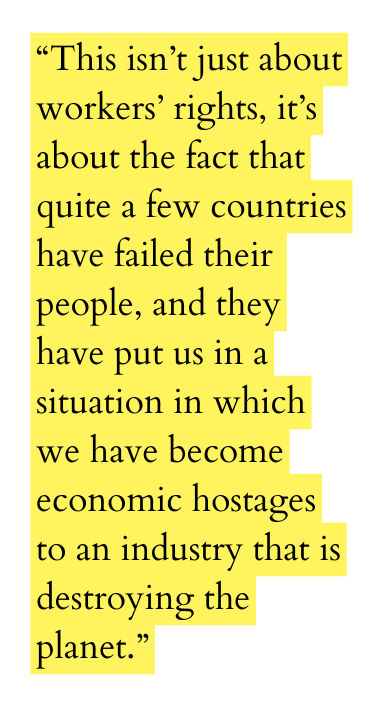
ERIEL: The issue in Canada is absurd. British Columbia’s right next door to us, and the gas that they are fracking there is being exported into Alberta to help them extract the tar sands. It’s insane.
One of the biggest challenges to a just transition in Canada is that there’s been a devolution of the state’s fiduciary responsibilities to provide social services to communities, and now these fossil fuel companies, through their philanthropic arms, are subsidizing social services. So all of our hospitals, schools, sports, recreation, cultural centers are all subsidized by oil and gas. If they were to leave tomorrow, our entire social structures and services would crumble.
This isn’t just about workers’ rights, it’s about the fact that quite a few countries have failed their people, and they have put us in a situation in which we have become economic hostages to an industry that is destroying the planet. Undoing this is going to be much more immense than just transitioning from one energy source to another and moving workers from one energy source to another. Our entire socio-economic frameworks will need to be reevaluated as part of the phasing out and getting off of fossil fuels.
OSPREY: One of the reasons we’re at Bioneers engaging in this systemic analysis is that it’s hard to just look at one piece of the poly-crisis. It’s all deeply connected: our economic system, Indigenous rights, feminism, what’s happening in the global geopolitical situation, etc. But the reason that we are collecting around the treaty is because it’s a vision of where we need to go, which is keeping fossil fuels in the ground and getting governments to sign on to that goal. The cold, hard, scientific fact is, whether we like it or not, we can’t really get anywhere if we don’t keep the fossil fuels in the ground.
But that absolutely doesn’t mean that the treaty is the only thing we work on. All of us also work tirelessly on one or more of the other critically important issues I mentioned that our organizations are specialized in focusing on.
AM: Could some sort of Universal Basic Income plan help workers and communities during the transition and so they’re less dependent on fossil fuel company funding?
EDUARDO: In Richmond, we’re actually considering a universal income for residents. They’ve done a trial in Fresno, and it has shown positive effects. And it’s not just for a transition away from fossil fuels, it would be a step toward a just economy. We are also thinking of creating a fund for a just transition and to provide some sort of insurance in case Chevron has a major disaster, so we in the city would have the money to cover it. Right now, fossil fuel companies self-insure, which means that when the time comes, they declare bankruptcy and leave communities holding the bag. So we need to create a mechanism in which they pay upfront as opposed “self-insuring.”
AM: How do you deal with the fear that many people feel about the enormous changes a transition requires?
OSPREY: Just to give one example, I have worked a lot on divestment campaigns trying to get banks to divest from fossil fuel companies. When you go into a room with a bunch of people at a bank, not only are they thinking a lot about numbers, they’re also afraid because we’re talking about their livelihoods and stopping the kinds of lucrative deals they make with fossil fuel companies. But what I’ve found is that face-to-face conversation is critically important. So, we’ll bring people who are being directly impacted by this industry: young people with asthma, Indigenous communities, women who have experienced generations of cancer in their families. There’s nothing like sitting people in front of other people who are saying: “We’re the people being impacted.” “This is how many cancers are in my family.” “This is how the land is being destroyed.” “We’re being harmed, but eventually you will be too, even if you’re feeling privileged over in your wealthy country or wealthy community. This will all come around.”
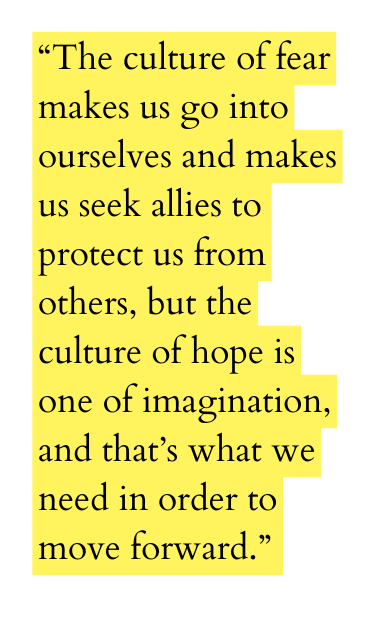
EDUARDO: I also think talking to people is critical. If you talk to one person, that person talks to another, and we share our stories. People relate much more to stories than they do to numbers, to facts, so if they hear your story, it becomes more real to them. But it’s also true that it doesn’t work trying to reason with unreasonable people. We have to be sure of where we’re going, and we have to be adamant about getting there.
ERIEL: One of the most important ways to overcome our fear is to stand with other people in our community and hold onto our beliefs together, but also to remember the immense power that exists in the lands and our interconnectedness and our relationships with those. I think that when you can see the immense beauty and power of this planet and remember that just the simple act of breathing connects you with the entire web of life and that with each breath you are connecting to something so big and so powerful that it has created everything on this planet, you start to see the fragility of systems of empire and colonialism and capitalism. You start to see that they are just a blip. If we can do that, our fear becomes small and our hope becomes so much bigger.
EDUARDO: The culture of fear makes us go into ourselves and makes us seek allies to protect us from others, but the culture of hope is one of imagination, and that’s what we need in order to move forward.
CARA: One way to overcome fear is to join a bigger group so that you’re not doing it alone. We encourage you to visit FossilFuelTreaty.org, endorse the treaty and contact us. We’ve got resources if you want to run campaigns or be a spokesperson. This is a distributed network. Join us. Thank you.
